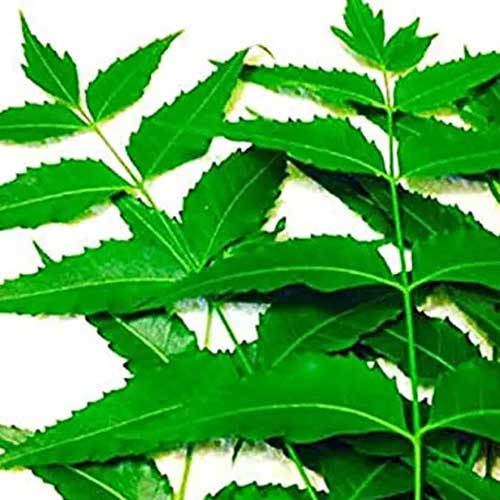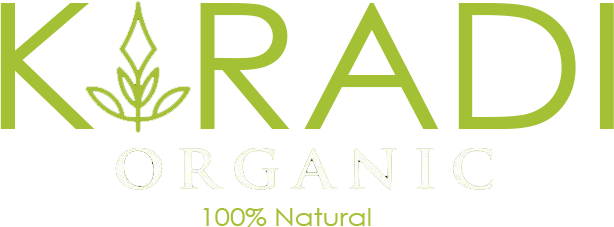
What is Neem?
The neem tree, Azadirachta indica, has a well-deserved reputation as the most potent medicinal plant in the world. The neem tree is known in Ayurveda as nature’s pharmacy. The tree grows predominantly in the Indian subcontinent but is now being cultivated in similar climates all over the world as people are beginning to recognise its usefulness.
Uses for Neem Fruits, Bark, Leaves, and Root
The neem tree is bursting with chemical compounds that have been proven to have numerous health benefits. All components of the neem tree, including the flower, fruit, seed, and root, have been widely used to treat a wide range of illnesses. According to well-established studies, neem is an excellent cancer treatment because it controls cell signaling pathways and has free radical scavenging properties because it is a rich source of antioxidants. By controlling the activity of pro-inflammatory enzymes including cyclooxygenase (COX) and lipoxygenase (LOX), neem also functions as an anti-inflammatory agent.
Aids with weight loss
If you’re seeking all-natural components that can aid in weight loss, you can consume neem leaves first thing in the morning on an empty stomach. Neem leaves have anti-obesity properties that encourage weight loss, according to a study. Neem leaf extracts may help individuals become less obese, according to a previous Food and Agricultural Organization (FAO) study.
Neem also aids in digestion by removing any harmful bacteria in the stomach and is anti-inflammatory and antibacterial. Additionally, neem leaves’ cooling qualities aid in digestion. Neem bark extracts are effective in treating gastrointestinal ulcers. Neem leaf used in the morning might therefore aid in lowering digestive problems including gas and acidity. It enhances digestion and helps people lose weight.
Aids in Controlling Acne Breakouts
Neem leaves are thought to offer several skin advantages. Neem leaf consumption on an empty stomach combined with topical application helps lessen acne outbreaks. The natural anti-acne gel made from neem leaf hydro-alcoholic extract significantly lessens outbreaks.
Neem leaves contain a substance called Nimbin, which has anti-inflammatory qualities, according to a study. It lessens the irritation caused by acne. The development of germs on the skin is one of the primary causes of acne. Neem leaves, which have strong antioxidant properties, aid in preventing acne-causing germs from proliferating. Neem leaves also aid in treating skin that is prone to acne.
Neem leaves can be consumed to treat acne-related redness and greasy skin. Additionally, the astringent qualities of neem leave aid in the fading of acne scars.
Supports Hair Health
Traditional medicine employs neem oil to get rid of lice from hair. It also encourages a healthy scalp and lessens dandruff. Neem leaves are beneficial in treating alopecia, or hair loss, according to study. Neem leaf antifungal qualities can aid in dandruff reduction.
Neem leaves work well to clean the scalp because of their antibacterial qualities. They support hair growth by clearing up clogged hair follicles.
Additionally, neem leaves’ antibacterial characteristics aid in providing treatment from a number of scalp issues. Therefore, if you have dandruff or other scalp issues, consuming 1-2 neem leaves on an empty stomach may be helpful.
Enhances Immunity
Neem leaf consumption on an empty stomach also enhances immunity. According to studies, neem leaf extract improves how well an animal’s immune system works.
Another study contends that the glycoproteins in neem leaf extracts support an immune-stimulating function that inhibits tumour growth. Neem leaves have antifungal, antibacterial, and antiviral activities, which support the immune system. It removes pollutants from the body and purifies the blood.
Neem leaves have immunostimulatory qualities that improve the body’s lymphocytic system’s functionality. They improve the body’s ability to fight off various incoming invaders through killer cells.
Aids in Blood Sugar Level Regulation
Neem leaves also help diabetics since they regulate blood sugar levels. Neem leaves efficiently treat type 2 diabetic mellitus, according to an animal study. Neem leaves cause this by increasing the body’s insulin signalling molecules and encouraging the skeletal muscles to utilise glucose.
Another study found that neem leaves contain a variety of bioactive substances, including flavonoids, tannins, saponins, and alkaloids. All of these substances are helpful in controlling diabetes.
Additionally, Neem leaf extracts have hypoglycemic properties that assist control blood sugar levels. Neem leaves contain a chemical called Nimbidin, which slows the rise in blood sugar levels.
Decreases Cancer Risk
Cancer prevention is a significant additional advantage of eating neem leaves on an empty stomach. Neem leaf extracts have reportedly been used to cure ailments like cancer since ancient times, according to study. Neem leaf anticancer properties aid in the treatment of cancer. They have bioactive substances like nimbolide and azadirachtin that inhibit the growth of cancerous cells in the body.
Another study reveals that the neem leaf extract’s anti-inflammatory characteristics aid in preventing oral squamous cell carcinoma (OSCC), a condition that leads to head and neck cancer.
Enhances Dental Health
You must have frequently observed your grandparents or parents brushing their teeth without using a toothbrush by using neem twigs. Numerous advantages for dental health are said to exist because to the neem plant. Neem leaves might help your tooth health if you eat them on an empty stomach. Neem leaf extracts are frequently used in mouthwashes to reduce tooth decay and cavities, according to study. Additionally, it can stop illnesses, oral infections, and irritated, bleeding gums. Neem leaves also help to maintain good oral health by preventing plaque buildup on the teeth.
Neem leaves, offer pain-relieving abilities that also treat toothaches. Neem leaves’ antibacterial qualities also help to prevent mouth ulcers.
Aids in Enhancing Vision
Neem leaves are also helpful for healing eye infections and enhancing vision when consumed on an empty stomach. Neem leaves are reportedly used in traditional medicine to prevent the development of bacteria that cause eye and ear infections. Neem leaves, according to Ayurveda, can aid in enhancing vision. They are also helpful for reducing eye redness and muscle weakness. The eye muscles are strengthened as well.
The existence of free radicals in the body is one of the main causes of cataracts, according to study. Cataracts can be effectively treated with plants that have antioxidant qualities. Neem leaves are advantageous in avoiding cataracts since they are a potent natural antioxidant.
Neem leaves may also be helpful in curing conjunctivitis and night blindness, according to research.
Gets Body Toxins Out
The ability of neem leaves to aid in the removal of body toxins is another significant advantage. Neem leaves are believed to have antibacterial qualities that can help treat a variety of fungi-related illnesses, including ringworm, athlete’s foot, and fungal infections of the intestines. Neem leaves can also be used to treat vaginal, oral, hand, and pulmonary yeast infections.
Additionally, they aid in preventing the development of harmful germs that can lead to typhoid, food poisoning, and pus production in the body.
Additionally, neem leaves have antiviral qualities that shield the body from specific pathogens. Extracts from neem leaves are effective against the chickenpox and smallpox viruses. The virus cannot reach the healthy bodily cells because of the leaves.
Neem leaves may also be helpful in treating viral illnesses including herpes and hepatitis B, according to some research.
Encourages Heart Wellness
Eating neem leaves on an empty stomach is also good for the heart, according to the Neem Organization. Neem leaves help control blood pressure, lower bad cholesterol in the body, and prevent blood clotting. A substance called nimbidin found in neem leaves aids in blood vessel dilation and lowers the risk of heart attacks. Neem leaves can also be used to treat irregular heartbeats.
Neem leaves may also be used to treat coronary heart disease successfully, according to studies. Neem leaf consumption is therefore advantageous for cardiovascular health.
FAQs
- What conditions does neem treat?
Neem is quite useful in treating epidermal disorders like acne, psoriasis, and eczema since it has antibacterial characteristics. Additionally, it is used to treat ringworm, scrofula, dormant ulcers, infected wounds, and septic sores.
- Neem leaves can they clean blood?
Neem leaves offer effective blood-purifying qualities. They assist in lowering toxin levels and reduce the likelihood of developing skin issues like acne, eczema, and skin rash.
- What occurs when neem is consumed?
Neem juice may provide medicinal benefits for treating conditions like diabetes, liver issues, and microbial infections. Neem juice may also possess anti-inflammatory, antioxidant, and wound-healing effects. You are encouraged to speak with your doctor first, nevertheless, before consuming neem juice for these purposes.
- Who should not take neem?
Neem should only be used by diabetics under the supervision of a physician to reduce the risk of dangerously low blood sugar levels.
- Does neem affect the kidney?
A potential candidate for nephroprotection against kidney injury is the neem leaf extract.






